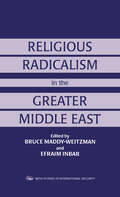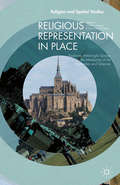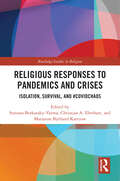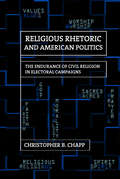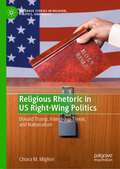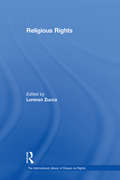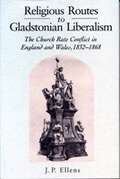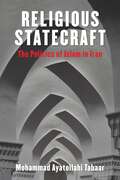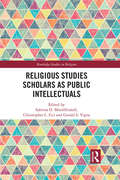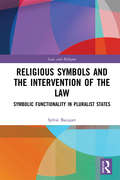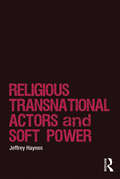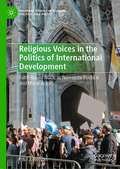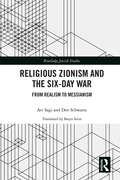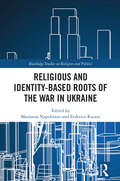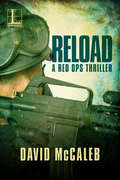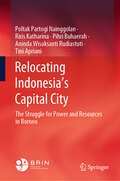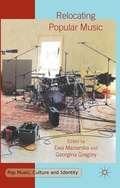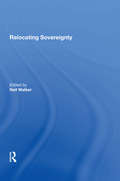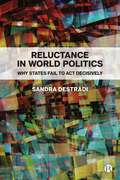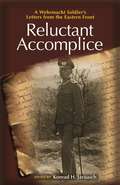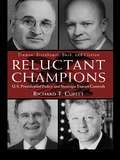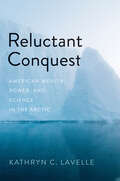- Table View
- List View
Religious Radicalism in the Greater Middle East (Cummings Center Series #No. 4)
by Bruce Maddy-Weitzman Efraim InbarThis collection offers a political analysis of religious radicalism in the Greater Middle East - comprising the Middle East, Central Asia and North Africa. The contributors present various conceptual perspectives including international relations, Middle East studies and political sociology.
Religious Radicalization and Securitization in Canada and Beyond
by Paul Bramadat Lorne DawsonAfter the terrorist attacks of 9/11, those in London and Madrid, and the arrest of the "Toronto 18," Canadians have changed how they think about terrorism and security. As governments respond to the potential threat of homegrown radicalism, many observers have become concerned about the impact of those security measures on the minority groups whose lives are "securitized."In Religious Radicalization and Securitization in Canada and Beyond, Paul Bramadat and Lorne Dawson bring together contributors from a wide range of academic disciplines to examine the challenges created by both religious radicalism and the state's and society's response to it. This collection takes a critical look at what is known about religious radicalization, how minorities are affected by radicalization from within and securitization from without, and how the public, media, and government are attempting to cope with the dangers of both radicalization and securitization.Religious Radicalization and Securitization in Canada and Beyond is an ideal guide to the ongoing debates on how best to respond to radicalization without sacrificing the commitments to multiculturalism and social justice that many Canadians hold dear.
Religious Representation in Place: Exploring Meaningful Spaces at the Intersection of the Humanities and Sciences (Religion and Spatial Studies)
by Mark K. George Daria Pezzoli-OlgiatiReligious Representation in Place brings together an interdisciplinary group of scholars from the Humanities and Sciences to broaden the understanding of how religious symbols and spatial studies interact. The essays consider the relevance of religion in the experience of space, a fundamental dimension of culture and human life.
Religious Responses to Pandemics and Crises: Isolation, Survival, and #Covidchaos (Routledge Studies in Religion)
by Marianne Bjelland Kartzow Sravana Borkataky-Varma Christian A. EberhartReligious Responses to Pandemics and Crises explores various dimensions of the interrelations between the individual, community, and religion. With their global scope, the contributions to this volume represent reflections on the rich and multifaceted spectrum of human responses in a variety of different religions and cultures to the current SARS-2-COVID-19 pandemic and similar crises in the past.The contributions are organized in three thematic parts focusing on strategies, rituals, and past and present responses to pandemics and crises. They reflect on the intersection of personal or communal responses and state-mandated policies relative to SARS-2-COVID-19 while outlining different strategies to cope with the pandemic crisis. Timely questions explored include: How do individuals connect with or disconnect from religious and spiritual communities during times of personal and collective crises, including pandemics? How do religious practices such as rituals bridge individuals and communities? How do religious texts from past and present highlight and represent crises and pandemics? Dynamic and multidisciplinary in its inquiry, this volume is an outstanding resource for scholars of religion, theology, anthropology, social sciences, ritual theory, sex and gender studies, and contemporary medical science.
Religious Responses to Pandemics and Crises: Isolation, Survival, and #Covidchaos (Routledge Studies in Religion)
by Sravana Borkataky-Varma, Christian A. Eberhart, and Marianne Bjelland KartzowReligious Responses to Pandemics and Crises explores various dimensions of the interrelations between the individual, community, and religion. With their global scope, the contributions to this volume represent reflections on the rich and multifaceted spectrum of human responses in a variety of different religions and cultures to the current SARS2-COVID-19 pandemic and similar crises in the past. The contributions are organized in three thematic parts focusing on strategies, rituals, and past and present responses to pandemics and crises. They reflect on the intersection of personal or communal responses and state-mandated policies relative to SARS2-COVID-19 while outlining different strategies to cope with the pandemic crisis. Timely questions explored include: How do individuals connect with or disconnect from religious and spiritual communities during times of personal and collective crises, including pandemics? How do religious practices such as rituals bridge individuals and communities? How do religious texts from past and present highlight and represent crises and pandemics? Dynamic and multidisciplinary in its inquiry, this volume is an outstanding resource for scholars of religion, theology, anthropology, social sciences, ritual theory, sex and gender studies, and contemporary medical science.
Religious Rhetoric and American Politics: The Endurance of Civil Religion in Electoral Campaigns
by Christopher B. ChappFrom Reagan's regular invocation of America as "a city on a hill" to Obama's use of spiritual language in describing social policy, religious rhetoric is a regular part of how candidates communicate with voters. Although the Constitution explicitly forbids a religious test as a qualification to public office, many citizens base their decisions about candidates on their expressed religious beliefs and values. In Religious Rhetoric and American Politics, Christopher B. Chapp shows that Americans often make political choices because they identify with a "civil religion," not because they think of themselves as cultural warriors. Chapp examines the role of religious political rhetoric in American elections by analyzing both how political elites use religious language and how voters respond to different expressions of religion in the public sphere.Chapp analyzes the content and context of political speeches and draws on survey data, historical evidence, and controlled experiments to evaluate how citizens respond to religious stumping. Effective religious rhetoric, he finds, is characterized by two factors-emotive cues and invocations of collective identity-and these factors regularly shape the outcomes of American presidential elections and the dynamics of political representation. While we tend to think that certain issues (e.g., abortion) are invoked to appeal to specific religious constituencies who vote solely on such issues, Chapp shows that religious rhetoric is often more encompassing and less issue-specific. He concludes that voter identification with an American civic religion remains a driving force in American elections, despite its potentially divisive undercurrents.
Religious Rhetoric in US Right-Wing Politics: Donald Trump, Intergroup Threat, and Nationalism (Palgrave Studies in Religion, Politics, and Policy)
by Chiara M. MiglioriThis book seeks to understand white conservative Christians’ support for Donald Trump, using their own words. Drawing on the triangular relationship between the 45th president, and his voters, and religious organizations, this work investigates the creation of the tale of Trump as the protector and enhancer of Christian values. The first part of the book discusses in detail the white conservative Christian constituency in the United States, and the development of feelings of displacement and resentment fostered by intergroup threat and nationalism. The central part focuses on the actor known as the “Religious Right,” through the rhetoric of one of their most representative organizations in the twenty-first century. The final part focuses on the character of Donald Trump and his peculiar relationship with religious discourse. The book demonstrates that while such discourse is expected of Trump as a Republican candidate, his approach to it is characterized by detachment and sloganized exploitation of Christian symbols. Ultimately, the book highlights the cultural tools that are crucial in the reproduction of structures of inequality and the ways they have been used by conservative politicians and groups to accumulate power.
Religious Rights (The International Library of Essays on Rights)
by Lorenzo ZuccaThe central focus of this collection of essays is the role and place of freedom of religion in the protection and promotion of world order. The volume offers competing models of world order from a global perspective and highlights the lack of consensus and considerable variety of practice and belief around the globe as to the definition of religious freedom and where and whether freedom of religion is regarded as the first freedom in the world. The leading theories of freedom of religion are discussed and provide an understanding of freedom of religion beyond the nation state. The liberal view at the global level is also examined and observations are included regarding the need to rethink secularism in the light of present circumstances and within the global context.
Religious Routes to Gladstonian Liberalism: The Church Rate Conflict in England and Wales 1852–1868 (G - Reference, Information and Interdisciplinary Subjects)
by Jacob EllensThis book, covering the period 1832 to 1868, describes how the so-called "church rates" controversy contributed to the rise of a secular liberal state in England and Wales. The church rate was an ancient tax required of all ratepayers, regardless of denomination, for the upkeep of parish churches of the Church of England. This meant that Dissenters and other non-Anglicans paid for the support of the established Church. In the 1830s, however, the Dissenters determined to tolerate the situation no longer. The resulting thirty-six-year struggle became the central church-state issue of the Victorian period. Ellens further argues that church rates played a pivotal role in the shaping of Victorian liberalism. Dissenters desired a society in which church and state would be separate and religious affairs voluntary. When Gladstone decided to champion the Dissenters' "voluntaryist" cause in the 1860s, he established the relationship that would give him the solid basis of electoral strength he needed to carry out the great liberal reforms of his governments after 1868. Elegantly written and argued, this book carefully details the process of disestablishment in England and Wales and uncovers an important and little-recognized dimension to the formation of the Liberal party.
Religious Statecraft: The Politics of Islam in Iran (Columbia Studies in Middle East Politics)
by Mohammad Ayatollahi TabaarSince the 1979 revolution, scholars and policy makers alike have tended to see Iranian political actors as religiously driven—dedicated to overturning the international order in line with a theologically prescribed outlook. This provocative book argues that such views have the link between religious ideology and political order in Iran backwards. Religious Statecraft examines the politics of Islam, rather than political Islam, to achieve a new understanding of Iranian politics and its ideological contradictions.Mohammad Ayatollahi Tabaar traces half a century of shifting Islamist doctrines against the backdrop of Iran’s factional and international politics, demonstrating that religious narratives in Iran can change rapidly, frequently, and dramatically in accordance with elites’ threat perceptions. He argues that the Islamists’ gambit to capture the state depended on attaining a monopoly over the use of religious narratives. Tabaar explains how competing political actors strategically develop and deploy Shi’a-inspired ideologies to gain credibility, constrain political rivals, and raise mass support. He also challenges readers to rethink conventional wisdom regarding the revolution, Ayatollah Khomeini, the U.S. embassy hostage crisis, the Iran-Iraq War, the Green Movement, nuclear politics, and U.S.–Iran relations. Based on a micro-level analysis of postrevolutionary Iranian media and recently declassified documents as well as theological journals and political memoirs, Religious Statecraft constructs a new picture of Iranian politics in which power drives Islamist ideology.
Religious Studies Scholars as Public Intellectuals (Routledge Studies in Religion)
by Sabrina D. MisirHiralall Christopher L. Fici Gerald S. VignaThe prominence of religion in recent debates around politics, identity formation, and international terrorism has led to an increased demand on those studying religion to help clarify and contextualise religious belief and practice in the public sphere. While many texts focus on the theoretical development of the subject, this book outlines a wider application of these studies by exploring the role of religious studies scholars and theologians as public intellectuals. This collection of essays first seeks to define exactly what makes an intellectual "public". It then goes on to deal with a few questions of concern: How do public intellectuals construct knowledge in religious and theological scholarship? What is the link between public intellectuals of higher education and their role in society? Do higher education institutions have a responsibility to endorse public intellectualism? Looking at the individual and collective role of religious studies scholars and theologians in public life, this book will be of great interest to all scholars and academics involved in religious studies and theology across the academy.
Religious Symbols and the Intervention of the Law: Symbolic Functionality in Pluralist States (Law and Religion)
by Sylvie BacquetIn contemporary pluralist states, where faith communities live together, different religious symbols and practices have to coexist. This may lead to conflicts between certain minority practices and the dominant majority, particularly around the manifestation of belief in the public domain which may be seen both by the religious and secular majorities as a threat to their cultural heritage or against the secular values of the host country. The law has to mitigate those tensions in order to protect the public from harm and preserve order but in doing so, it may where necessary have to limit citizens’ ability to freely manifest their religion. It is those limitations that have been disputed in the courts on grounds of freedom of religion and belief. Religious symbols are often at the heart of legal battles, with courts called upon to consider the lawfulness of banning or restricting certain symbols or practices. This book analyses the relationship between the state, individuals and religious symbols, considering the three main forms of religious expression, symbols that believers wear on their body, symbols in the public space such as religious edifices and rituals that believers perform as a manifestation of their faith. The book looks comparatively at legal responses in England, the U.S.A and France comparing different approaches to the issues of symbols in the public sphere and their interaction with the law. The book considers religious manifestation as a social phenomenon taking a multidisciplinary approach to the question mixing elements of the anthropology, history and sociology of religion in order to provide some context and examine how this could help inform the law.
Religious Transnational Actors and Soft Power (Religion and International Security)
by Jeffrey HaynesHaynes looks at religious transnational actors in the context of international relations, with a focus on both security and order. With renewed scholarly interest in the involvement of religion in international relations, many observers and scholars have found this move unexpected because it challenges conventional wisdom about the nature and long-term historical impact of secularisation. The 'return' of religion to international relations necessarily involves deprivatisation. Recent challenges to international security and order emanate from various entities, notably 'extremists', people often said to be 'excluded' from the benefits of globalisation for reasons of culture, history and geography. This study looks at the dynamics of this new religious pluralism as it influences the global political landscape. Several specific transnational religious actors are examined in the chapters including: American Evangelical Protestants, Roman Catholics, the Organisation of the Islamic Conference, Sunni extremist groups (al Qaeda and Lashkar-e-Taiba), and Shia transnational networks. While varying widely in what they seek to achieve, they also share an important characteristic: each seeks to use religious soft power to advance their interests. In sum, these religious transnational actors all wish to see the spread and development of certain values and norms, which impact on international security and order.
Religious Transnationalism and Climate Change: The Role of Non-State Actors (Human Rights Interventions)
by Samadia SadouniThis book examines the role of religious actors in the field of climate change and especially in the international mobilization and negotiations to address the issue. It analyzes the mode of action and their discourses on multilateral platforms such as the United Nations Framework Convention on Climate Change (UNFCCC). The international Climate Change Framework Convention is primarily a process that can best be understood by analyzing the various steps taken by the international community, and specifically by different religious groupings, here, in the project manuscript, mainly Christians but also Muslims and Buddhists, in raising environmental consciousness through their programs. The interfaith dimension also plays a major role and needs to be studied in terms of the international realm of international liberal theories based on reciprocity, interdependence and cooperation but also within the framework of Sustainable Development Goals.
Religious Voices in the Politics of International Development: Faith-Based NGOs as Non-state Political and Moral Actors (Palgrave Studies in Religion, Politics, and Policy)
by Paul J. NelsonThis first study of faith-based development NGOs’ (FBOs) political roles focuses on how U.S. FBOs in international development educate and mobilize their constituencies. Most pursue cautious reformist agendas, but FBOs have sometimes played important roles in social movements. Nelson unpacks those political roles by examining the prominence of advocacy in the organizations, the issues they address and avoid, their transnational relationships, and their relationships with religious and secular social movements. The agencies that educate and mobilize U.S. constituencies most actively are associated with small Christian sects or with non-Christian minority faiths with historic commitments to activism or service. Specialized advocacy NGOs play important roles, and emerging movements on immigration and climate may represent fresh political energy. The book examines faith-based responses to the crises of climate change, COVID-19, and racial injustice, and argues that these will shape the future of religion as a moral and political force in America, and of NGOs in international development.
Religious Zionism and the Six Day War: From Realism to Messianism (Routledge Jewish Studies Series)
by Avi Sagi Dov SchwartzThis book offers a new insight into the political, social, and religious conduct of religious-Zionism, whose consequences are evident in Israeli society today. Before the Six-Day War, religious-Zionism had limited its concern to the protection of specific religious interests, with its representatives having little share in the determination of Israel’s national agenda. Fifty years after it, religious-Zionism has turned into one of Israeli society’s dominant elements. The presence of this group in all aspects of Israel’s life and its members’ determination to set Israel’s social, cultural, and international agenda is indisputable. Delving into this dramatic transformation, the book depicts the Six-Day War as a constitutive event that indelibly changed the political and religious consciousness of religious-Zionists. The perception of real history that had guided this movement from its dawn was replaced by a "sacred history" approach that became an actual program of political activity. As part of a process that has unfolded over the last thirty years, the body and sexuality have also become a central concern in the movement’s practice, reflection, and discourse. The how and why of this shift in religious-Zionism – from passivity and a consciousness of marginality to the front lines of public life – is this book’s central concern. The book will be of interest to readers and scholars concerned with changing dynamic societies and with the study of religion and particularly with the relationship between religion and politics.
Religious and Identity-Based Roots of the War in Ukraine (Routledge Studies in Religion and Politics)
by Federico Ruozzi Marianna NapolitanoReligious and Identity-Based Roots of the War in Ukraine critically analyses the religious and identity-based roots of the Russo-Ukrainian War from a long-term historical perspective.The book traces the elements that render this war not only geopolitical but also a conflict in which religion is instrumentalized to serve narratives of state power and identity formation in both post-soviet Russia and Ukraine. It explores the interplay between Church and State, the ‘imperial’ concept of Russkyi Mir (Russian world), and the dichotomy of traditional Slavic values versus modern Western globalisation. The book also examines the process that impacted the narrative of Orthodox identity after the Soviet Union, and its connection to the war. Furthermore, it explores the use of public history throughout the hostilities, offering a detailed analysis of the cultural aspects of the Russian-Ukrainian conflict, the construction of identities through monumentalisation and the role of art in engaging with the past. The perspectives of religious agents during the conflict are discussed, such as Patriarch Kirill’s narrative of the gay parade as a threat to the Russian world, the Ukrainian Orthodox Church’s declaration of independence from the Moscow Patriarchate, the peace mission of the Vatican and the Ecumenical Patriarch Bartholomew’s defence of the right to recognise the independence of the Ukrainian Orthodox Church. Additionally, providing a long-term perspective, the book explores Church-State interplay in Russia from Nicholas II to El’tsin, as well as the consequences of the fall of the Soviet Union and possibilities for a dialogue of peace.Religious and Identity-Based Roots of the War in Ukraine will be of great interest to advanced students and scholars of Contemporary History, Religious Studies, History of Christianity, Political Science, Russian Studies and Ukrainian Studies.
Reload: A Red Ops Thriller (A Red Ops Thriller #2)
by David McCalebA special ops veteran is pulled into a dangerous North Korean mission to protect his family in this military thriller by the author of Recall.To save his family—and the free world—Red Harmon is back in the line of fire . . .A sinister enemy is stalking elite military operator Red Harmon and his loved ones. Turning the hunter into his prey, Red uncovers a plot that spans nations and draws him into the remote snow-covered ravines of North Korea. His objective: penetrate the darkest prisons of this mysterious nation to restore national security—and save all he holds dear. Caught in the danger . . .Red&’s not the only one who&’s been living with secrets. His wife Lori is a lot more than the typical suburban soccer mom she appears to be, and she&’s stumbled onto something massive. The future of world peace depends on them—and on an enemy soldier with a powerful personal agenda. If Red&’s mission fails, the balance of superpowers may never recover . . .Praise for Reload &“David McCaleb delivers with Reload! Red Harmon is a gritty hero who comes through in the clutch and McCaleb&’s gripping plot is the stuff of today's headlines. A must read for all fans of thriller fiction!&” —A. J. Tata, national bestselling author of Three Minutes to Midnight
Relocating Indonesia’s Capital City: The Struggle for Power and Resources in Borneo
by Poltak Partogi Nainggolan Riris Katharina Pihri Buhaerah Aninda Wisaksanti Rudiastuti Tini AprianiThis book looks at the process of relocating Indonesia's capital from Jakarta to Nusantara in East Kalimantan. It looks critically at the surrounding conflict and its causes, as well as the solution from the perspective of evidence-based-policy and regulatory impacts assessments whose presence is increasingly needed today, to campaign for participatory policies and achieve the right targets. It is not widely known that the process of relocation of the capital took place behind closed doors and unilaterally. Through a closed legislative process, without public debate, and by amending the constitution later, this takeover process took place without resistance from disadvantaged regions. Following this, when the central government faced financing difficulties along the way, its development budget initially relied on foreign investment, then became dependent on domestic financing, both sourced from state finances (APBN) and local resources. From here, the book maps the subsequent problems that arose, the first of which relates to local resources. It shows how local residents are also affected with land evictions without proper relocation. Through political-economic research and analysis, the book dissects the conflict as it appears in central-regional power relations, by exploring the roots of the problem and recommending several solutions, as well as looking at possible future development of the conflict. This timely book is helpful to those who carry out development studies and are involved in making public policy for campus, government, parliament and the business world.
Relocating Popular Music
by Ewa MazierskaRelocating Popular Music uses the lenses of colonialism and tourism to analyse various types of movements of popular music, such as transporting music from one place or historical period to another, hybridising it with a different style and furnishing it with a new meaning. This accessible and jargon-free collection discusses music in relation to music video, film, graphic arts, fashion and architecture, while covering a wide variety of phenomena from all over the world. It includes, the changing role of rock music in Serbia after the Balkan wars, the function of Abbey Road Studios in music tourism in England, the relation between minimalist techno and classical minimalism, and transforming the meaning of Detroit in Eminem's music videos. The authors argue that popular music is by its nature 'unpure', and studying it means studying its relocations.
Relocating Sovereignty (The\international Library Of Essays In Law And Legal Theory (second Series) Ser.)
by Neil WalkerThis volume brings together a collection of classic and contemporary texts which engage with the core problem of sovereignty from the perspective of various legal and law-related sub-disciplines: legal history and theory, constitutional law, international law and relations and EU law. Many of the highlights from the intense debates about the continuing relevance or otherwise of the internal sovereignty of national legal orders and the external sovereignty of states in a rapidly- globalizing world are reproduced here.c
Reluctance in World Politics: Why States Fail to Act Decisively
by Sandra DestradiWhy do international actors, including powerful states, often fail to develop clear foreign policies and instead adopt indecisive, ‘muddling-through’ approaches? This book develops a concept and a theory of reluctance in world politics. Applying it to the study of regional crisis management by leading powers, it finds that reluctance emerges when governments fail to devise clear foreign policy preferences and face competing international pressures. The study of reluctance in world politics sheds new light on some of the most pressing problems of our time, from weak crisis management to cooperation deficits in global governance.
Reluctant Accomplice: A Wehrmacht Soldier's Letters from the Eastern Front
by Konrad H. JarauschAn ordinary German soldier’s letters home from Poland and Russia during World War IIReluctant Accomplice is a volume of the wartime letters of Dr. Konrad Jarausch, a German high-school teacher of religion and history who served in a reserve battalion of Hitler's army in Poland and Russia, where he died of typhoid in 1942. He wrote most of these letters to his wife, Elisabeth. His son, acclaimed German historian Konrad H. Jarausch, brings them together here to tell the gripping story of a patriotic soldier of the Third Reich who, through witnessing its atrocities in the East, begins to doubt the war's moral legitimacy. These letters grow increasingly critical, and their vivid descriptions of the mass deaths of Russian POWs are chilling. They reveal the inner conflicts of ordinary Germans who became reluctant accomplices in Hitler's merciless war of annihilation, yet sometimes managed to discover a shared humanity with its suffering victims, a bond that could transcend race, nationalism, and the enmity of war.Reluctant Accomplice is also the powerful story of the son, who for decades refused to come to grips with these letters because he abhorred his father's nationalist politics. Only now, late in his life, is he able to cope with their contents—and he is by no means alone. This book provides rare insight into the so-called children of the war, an entire generation of postwar Germans who grew up resenting their past, but who today must finally face the painful legacy of their parents' complicity in National Socialism.
Reluctant Champions: U.S. Presidential Policy and Strategic Export Controls, Truman, Eisenhower, Bush and Clinton
by Richard T. CupittFirst published in 2000. Routledge is an imprint of Taylor & Francis, an informa company.
Reluctant Conquest: American Wealth, Power, and Science in the Arctic
by Kathryn C. LavelleA comprehensive history of U.S. involvement in the Arctic, from the American Revolution through the acquisition of Alaska to the present day What drives American foreign relations in the Arctic? It is difficult to give a unified answer to this question because most histories of the region are divided between the Atlantic and Pacific coasts, Asian and European strategic interests, or federal government and Indigenous peoples&’ concerns, making it difficult to understand the connections among the environmental challenges, scientific understandings, strategic calculations, and governance relationships. Most Americans do not think of their country as an Arctic power, yet it is a region where the United States has had important ties throughout its history. In this sweeping study, from the founding of the country through the acquisition of Alaska to the present, Kathryn C. Lavelle considers American relations across the circumpolar North, incorporating discussions of economics, national security, and science that are conventionally separated. Lavelle argues that it is impossible to understand U.S. policy without a knowledge of American political development and of how scientific understandings have grown alongside studies of climate and other environmental issues. This history has important implications for future American policy regarding traditional national security and political economy, in addition to climate change and environmental cooperation.
